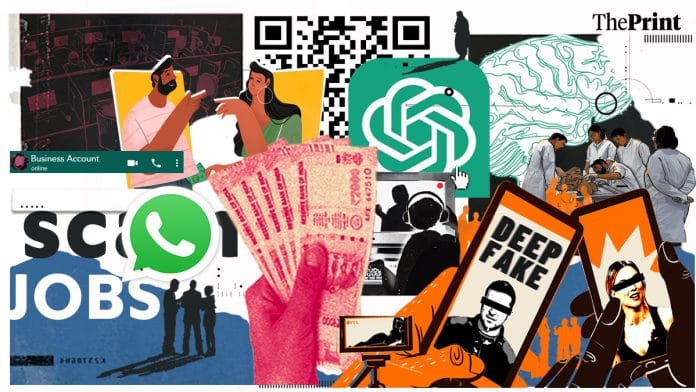The year 2023 saw unprecedented challenges from the ever-evolving technology landscape. While a significant chunk of ordinary people have adapted to advancements in the digital sector, many fell prey to scammers, including celebrities like Rashmika Mandanna. And how big the deep fake issue has become can be gauged from the fact that Prime Minister Narendra Modi took it upon himself to caution the nation about AI’s “darker aspects”.
As AI advanced to rival human intelligence, India had its own tech tango in 2023. Let’s revisit five such tech trends:
AI is here, not in some distant future

India is adopting AI like never before and the way Chat GPT has penetrated industries was unthinkable for AI applications even two years ago. Indians are experimenting with AI just like the rest of the world. OLA, a company known for its cab aggregator app, recently introduced Krutrim, an AI model that codes in real-time and generates output in 10 Indian languages. The All India Institute of Medical Sciences (AIIMS), the country’s premier medical centre, is all set to embrace AI to “be future-ready”, while Apollo Hospitals have already rolled out ProHealth, an AI algorithm that can study a patient’s medical history and predict potential medical risks.
Deepfakes

The disturbing proliferation of ‘deepfakes’ made headlines in 2023. Remember that digitally manipulated video of actorRashmika Mandanna that went viral? As convincing as it was, the video didn’t feature Mandanna at all. The issue became more serious when deepfakes of Priyanka Chopra Jonas, Alia Bhatt and even Hollywood actor Tom Hanks surfaced on the internet. While deepfakes aren’t new, Mandanna’s case was an eye-opener as it pointed to an urgent need for advanced authentication measures and stringent regulations to curb the misuse of deepfake technology.
As the issue of deepfakes escalates, it is crucial to understand the broader implications of this technology. The rise of deepfakes not only raises concerns about misinformation but also highlights the urgent need for regulations to protect individuals from potential harm.
Also read:
WhatsApp scams

WhatApp job scams were a common occurrence in 2023. With the Facebook-owned messenger app increasingly moving toward the commercialisation of its services, it was only a matter of time before personal data landed with scamsters. With the rise of unemployment and competition in the job market, people are desperate for opportunities to earn money and fraudsters know exactly how to exploit their vulnerabilities. They contact them through WhatsApp, often using international numbers, and ask them to review videos or similar tasks to earn a commission. In one such case, an IT engineer from Pune, who was promised a 30 per cent return on her investment, ended up losing Rs 49 lakh. Time a new channel for personal messaging was opened?
The QR con

Recently, a 30-year-old professor from the Indian Institute of Science in Bengaluru fell victim to a QR code scam while trying to sell his washing machine. The buyer requested the seller to scan a QR code so that he could quickly transfer money to his bank account. However, as soon as the professor scanned the code, Rs 63,000 were siphoned from his account. Of course, this incident wasn’t an isolated one – many other cases of QR code fraud have emerged over the last few months. After ‘tell me the OTP’, ‘scan this QR’ is the new net of fraudsters. More challenges for Digital India ahead.
Also read:
Date baits

In 2023, scammers began using dating as well as matrimonial apps to scam people under the pretext of sending expensive gifts. Around two-thirds of Indian adults have fallen victim to online dating/romance scams, losing an average of Rs 7,966 according to an India Today report. With the increasing popularity of online dating platforms, perpetrators have found a new source to exploit the vulnerable seeking companionship. The Gurugram case in which a woman duped nearly a dozen men is the biggest example of how frauds have become the ‘Tinder Swindlers’.
(Edited by Zoya Bhatti)






